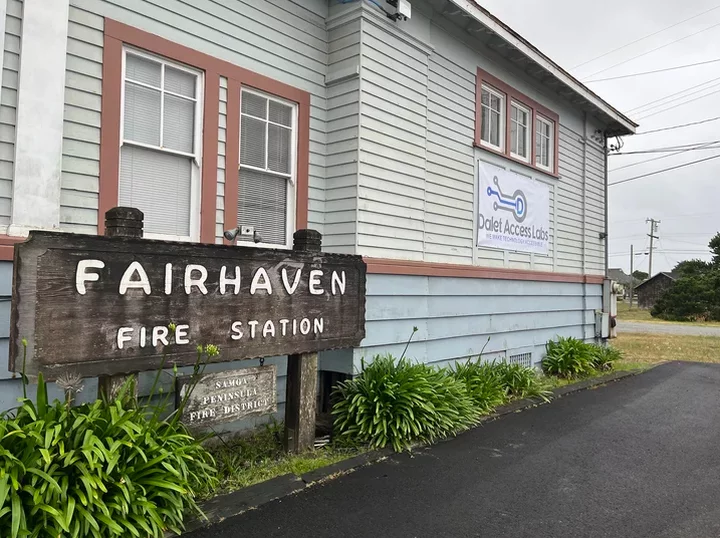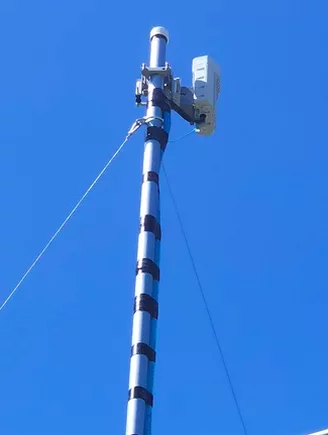Dalet Access Labs’ center of operations at the Fairhaven Fire Station in July, 2022| Images submitted by the Humboldt County Office of Education
PREVIOUSLY:
###
Readers might remember last summer, when the entire community of Fairhaven was provided with free high-speed internet as a part of the California Digital Divide Innovation Challenge, a contest that promised a winning prize of $1 million to a company that could find a way to provide accessible internet throughout the state.
The service was installed by Bay Area company Dalet Access Labs, which worked with help from Humboldt County Department of Education (HCOE) and the Samoa Peninsula Fire District, to install the Fairhaven service. At the time, Odion Edohomon, president and CEO Dalet Access Labs, was so happy with the outcome of the project that he seemed almost certain his company would win the contest.
Unfortunately, Edohomon did not win. In fact, a recent report in the San Francisco Chronicle found that none of the entries won the $1 million and the contest turned out to be a bust.
“I don’t think there was any chance [of winning],” Edohomon said in a recent interview with the Outpost. “We met all the requirements. But [people running the challenge] were sloppy. They didn’t do a follow up.”
The contest was launched in 2021 by the California Department of Education and funded by the Michelson Foundation, General Motors, Genentech and PG&E, as a way to help bridge the digital divide, especially for students who were unable to participate in digital learning during COVID. Searching for an innovative and speedy solution to the issue, CDE put the call out for entries, with the requirements that service cost no more than $15/month per household, include 100 megabits synchronous upload and download speed with no data caps, and have fully deployable implementation within a year.
The challenge also stipulated that the competitors must test their innovation with students experiencing a lack of connectivity either due to barriers of affordability or infrastructure. The tiny community of Fairhaven, which has not consistently had internet service available and had many children unable to access virtual learning, seemed like the perfect fit.
Assigned to Fairhaven, Dalet Access Labs went to work installing free service for the 78 homes in the community. The company worked with Cogent Communications and AT&T to launch a live fiber optic line to the Fairhaven fire station. From there the signal is sent out to five antenna nodes, which the company installed on the roofs of houses scattered throughout the community. The network also operates completely on solar power, which charges batteries that can keep the power running 24/7. Fairhaven’s internet went live on July 1, 2022 and the residents have been enjoying the service ever since.
After the system was deployed, the Humboldt County Office of Education praised the project, saying in a press release that the service with low latency speeds of 700 to 900 megabits, surpassed the requirements for the Innovation Challenge. “It’s an amazing example of what public-private partnership can do to help address and solve a real problem,” Colby Smart, HCOE assistant superintendent, educational service, said in the press release sent in August.
Dalet Labs’ entry was also celebrated by the Department of Education, and representatives from the department, including Chief Deputy Superintendent Mary Nicely, attended the project’s ribbon cutting ceremony in October. A press release sent about the event also stated that the project “surpassed the minimum requirements.” Edohomon said that this response gave him some encouragement. But, he did think it was strange that no one from the corporations that were judging the contest was present.
Nicely sent him one follow-up email following the ceremony, asking what the cost of infrastructure was and what the monthly cost per household would be. Edohomon replied that the sustainable monthly cost would be $80 per household, but that for low-income households with students, the monthly fee would be $15, which could be achieved with government subsidies to cover the other $65. But the positive response seemed to end there and shortly after the ribbon cutting, Edohomon said, the state officials involved fell silent, not returning any of his emails or calls about the contest for months.
When Edohomon did finally receive a response, Nicely said that the judges — which included members of the Michelson Foundation, General Motors, Genentech and PG&E — determined that none of the entries met all of the required criteria to win.
“We know this was an ambitious challenge,” Nicely wrote in an email to Edohomon. “The main concern was the lack of sustainability shown by any challenger. In light of this, we encourage you to work with one of our partners, The Michelson 20MM Foundation as they support up and coming entrepreneurs and community organizations in developing innovative and sustainable solutions to the major problems facing our communities today.”
In other emails between Nicely and Chronicle reporter Jill Tucker, Nicely said that the main issue with Edohomon’s entry was that it failed to meet the requirement that monthly service cost $15 per household, something that apparently the judges wanted for every household, not just for students.
Still, after the Department of Education attended the ribbon cutting and sent out a press release saying that the Fairhaven project met all the requirements, Edohomon is left feeling a little burned, especially since he spent more than $400,000 on the project. And according to the Chronicle’s reporting, other contestants felt the same way, some saying that the whole thing just seemed like a publicity stunt.
Meanwhile, Fairhaven residents will have the high-speed internet service disconnected on April 17. But Edohomon hopes that there can be a way to keep the service going for Fairhaven and said he will continue working with local stakeholders – including the HCOE, the Peninsula Union School District and the County of Humboldt Economic Development – to find options for providing all of the Samoa Peninsula with access to affordable, high-speed internet
“It’s still our plan to extend to Samoa, to the peninsula schools and to serve all those homes, including the affordable housing that DANCO built there,” Edehomon said.


CLICK TO MANAGE